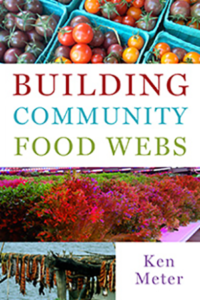Our current food system has decimated rural communities and confined the choices of urban consumers. Even while the United States continues to ramp up farm production to astounding levels, net farm income is now lower than at the onset of the Great Depression, and one out of every eight Americans faces hunger. But a healthier and more equitable food system is possible. In Building Community Food Webs, Ken Meter shows how grassroots food and farming leaders across the US are tackling these challenges by constructing civic networks. Overturning extractive economic structures, these inspired leaders are engaging low-income residents, farmers, and local organizations in their quest to build stronger communities.
Community food webs strive to build health, wealth, capacity, and connection. Their essential element is building greater respect and mutual trust, so community members can more effectively empower themselves and address local challenges. Farmers and researchers may convene to improve farming practices collaboratively. Health clinics help clients grow food for themselves and attain better health. Food banks engage their customers to challenge the root causes of poverty. Municipalities invest large sums to protect farmland from development. Developers forge links among local businesses to strengthen economic trade. Leaders in communities marginalized by our current food system are charting a new path forward.
Building Community Food Webs captures the essence of these efforts, underway in diverse places including Montana, Hawai‘i, Vermont, Arizona, Colorado, Indiana, and Minnesota. Addressing challenges as well as opportunities, Meter offers pragmatic insights for community food leaders and other grassroots activists alike.


 Ken Meter is one of the most experienced food system analysts in the United States, integrating market analysis, business development, systems thinking, and social concerns. Meter holds 50 years of experience in inner-city and rural community capacity building. His local economic analyses have promoted local food networks in 143 regions in 41 states, two provinces, and four tribal nations. He was commissioned to create statewide food system assessments for New Hampshire, Hawai’i, Alaska, Mississippi, South Carolina, Indiana, Ohio, and Minnesota, and developed strategic regional food plans for 16 regional food systems. Meter consulted with the USDA Agricultural Marketing Service and Colorado State University as one of 14 co-authors of a toolkit for measuring economic impacts of local food development. He is co-editor of Sustainable Food System Assessment: Lessons from Global Practice (Routledge, UK) in 2019. Meter’s work can be found at
Ken Meter is one of the most experienced food system analysts in the United States, integrating market analysis, business development, systems thinking, and social concerns. Meter holds 50 years of experience in inner-city and rural community capacity building. His local economic analyses have promoted local food networks in 143 regions in 41 states, two provinces, and four tribal nations. He was commissioned to create statewide food system assessments for New Hampshire, Hawai’i, Alaska, Mississippi, South Carolina, Indiana, Ohio, and Minnesota, and developed strategic regional food plans for 16 regional food systems. Meter consulted with the USDA Agricultural Marketing Service and Colorado State University as one of 14 co-authors of a toolkit for measuring economic impacts of local food development. He is co-editor of Sustainable Food System Assessment: Lessons from Global Practice (Routledge, UK) in 2019. Meter’s work can be found at 


